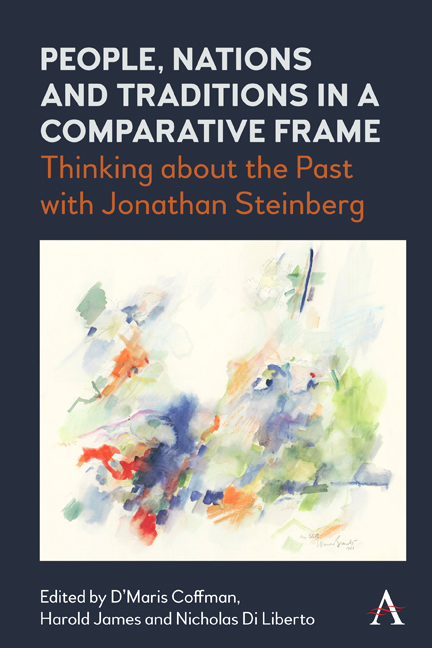 People, Nations and Traditions in a Comparative Frame
People, Nations and Traditions in a Comparative Frame Book contents
- Frontmatter
- Contents
- Foreword
- Acknowledgements
- Notes on Contributors
- Introduction
- Part One Methodological Pluralism and New Applications
- Part Two Personal and National Character
- Part Three Society, Families and the Sovereign Self
- Part Four History Out of Sync: Modernity and Tradition
- Part Five History, Narrative and the Human Condition
- Afterword
- Bibliography of Jonathan Steinberg’s Works
- Index
Chapter Two - Swiss History Only as National History? How to Break out of the Cage of National Historiography
Published online by Cambridge University Press: 23 February 2022
- Frontmatter
- Contents
- Foreword
- Acknowledgements
- Notes on Contributors
- Introduction
- Part One Methodological Pluralism and New Applications
- Part Two Personal and National Character
- Part Three Society, Families and the Sovereign Self
- Part Four History Out of Sync: Modernity and Tradition
- Part Five History, Narrative and the Human Condition
- Afterword
- Bibliography of Jonathan Steinberg’s Works
- Index
Summary
The American historian Jonathan Steinberg is justly renowned for his studies on nineteenth-and twentieth-century Europe. However, the fact that he also wrote an important book on Swiss history that has now appeared in a third edition is often overlooked. Steinberg's interest in Switzerland is not marginal and warrants some explanation. At least two reasons come to mind. One is personal. The other, more substantial explanation has to do with the keen interest – indeed fascination – that Steinberg, as a historian of the modern period, has for the pre-modern, ‘medieval’ social and political structures which he has traced in English Cambridge and in Switzerland. He has therefore become a great expert on Switzerland and can tell most Swiss more about their country than they know about it themselves. Yet Steinberg is not entirely neutral, since he loves this country. For Swiss persons, who sometimes would rather leave their country's unique past behind, this love of Swiss history is rather excessive. But precisely for this reason, his external viewpoint is greatly appreciated among other Swiss.
For many in Switzerland, especially within professional circles, the fact that almost only Swiss historians deal with the history of Switzerland is rather unsettling. Hans Ulrich Jost warns against history writing that focuses on a special case, arguing instead for the need ‘to keep in mind the impact, often crucial, of the international framework’. Yet, so as not to immediately succumb to the explanation of Helvetismus – which often perceives any phenomenon occurring in this small country as typical – it should be noted that the question of the conditions under which national history is written has been addressed elsewhere as well. This discomfort might seem at first sight justified; yet, the way in which the problem is formulated falsely assumes that national belonging shapes to a large degree and perforce ways of thinking.
Historical studies that take the form of books are usually products of complex processes composed of various factors and decisions. In the case of general works, which are the focus of the present paper, the role of the publishing houses, their evaluations of the market (regarding the demand and distribution potential) and their decision to publish a particular author are all of great importance.
- Type
- Chapter
- Information
- People, Nations and Traditions in a Comparative FrameThinking about the Past with Jonathan Steinberg, pp. 27 - 44Publisher: Anthem PressPrint publication year: 2021


